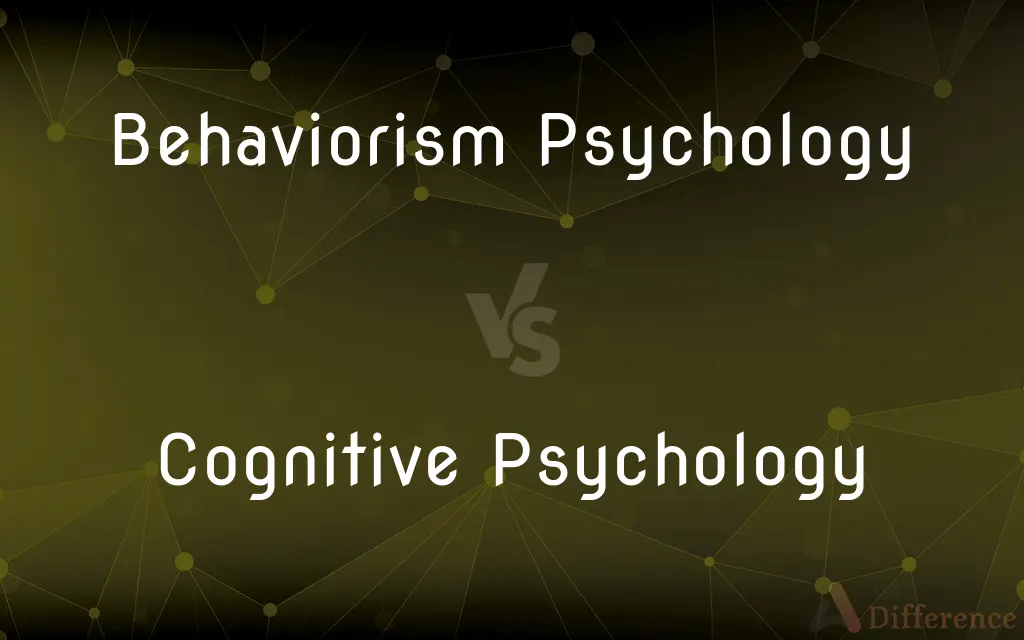Behaviorism Psychology vs. Cognitive Psychology — What's the Difference?
Edited by Tayyaba Rehman — By Fiza Rafique — Published on December 20, 2023
Behaviorism Psychology focuses on observable behaviors and external stimuli. Cognitive Psychology delves into internal mental processes like thinking and memory.

Difference Between Behaviorism Psychology and Cognitive Psychology
Table of Contents
ADVERTISEMENT
Key Differences
Behaviorism Psychology is rooted in the idea that all behaviors are learned through interactions with the environment. It emphasizes that human behavior is shaped by external stimuli and responses, essentially claiming that individuals are largely products of their environment. Cognitive Psychology, in contrast, delves into the internal workings of the mind and seeks to understand how people think, remember, perceive, and learn.
The foundational premise of Behaviorism Psychology is that behaviors can be measured, trained, and changed. This school of thought often disregards unobservable phenomena, like feelings or thoughts, considering them to be outside the realm of empirical study. On the other hand, Cognitive Psychology posits that these internal mental processes are central to understanding human behavior and should be studied in-depth.
While Behaviorism Psychology often employs conditioning methods, like reinforcement and punishment, to modify behavior, Cognitive Psychology may investigate how problem-solving techniques, memory recall, or perception influence behavior. This demonstrates that Behaviorism views behavior as an output in response to a stimulus, while Cognitive Psychology sees behavior as influenced by numerous internal processes.
John B. Watson and B.F. Skinner are notable figures in the realm of Behaviorism Psychology, championing the idea that the environment shapes behavior. Cognitive Psychology, with luminaries like Jean Piaget and Aaron Beck, seeks to understand the intricate web of mental processes that lead to these behaviors.
Both Behaviorism Psychology and Cognitive Psychology have made significant contributions to understanding human behavior. However, their distinct approaches — Behaviorism's emphasis on observable behaviors and Cognitive's focus on mental processes — set them apart in the field of psychology.
ADVERTISEMENT
Comparison Chart
Focus
Observable behaviors and external stimuli
Internal mental processes like thinking, memory, and perception
Study Methods
Conditioning methods, reinforcement, punishment
Experiments on memory, perception, and problem-solving
Key Proponents
John B. Watson, B.F. Skinner
Jean Piaget, Aaron Beck
View on Internal Processes
Often disregards unobservable phenomena like feelings or thoughts
Central to understanding human behavior
Applications
Behavior modification through external factors
Cognitive therapies, understanding mental disorders
Compare with Definitions
Behaviorism Psychology
A field rooted in the premise that behaviors are learned.
Behaviorism Psychology studies how behaviors can be trained and modified.
Cognitive Psychology
A study of internal mental processes influencing behavior.
Cognitive Psychology seeks to understand how memory affects our decisions.
Behaviorism Psychology
The domain where behavior is the primary unit of analysis.
Behaviorism Psychology largely ignores what happens inside the mind, focusing instead on observable behavior.
Cognitive Psychology
A domain exploring problem-solving, memory, and perception mechanisms.
Research in Cognitive Psychology has provided insights into memory recall techniques.
Behaviorism Psychology
An approach disregarding unobservable mental processes.
In Behaviorism Psychology, the focus is solely on observable responses to stimuli.
Cognitive Psychology
An approach emphasizing the role of mental structures in shaping behavior.
Cognitive Psychology investigates how perceptions shape our reactions to stimuli.
Behaviorism Psychology
A perspective seeing behavior as an output to specific stimuli.
According to Behaviorism Psychology, a specific stimulus will lead to a predictable behavior.
Cognitive Psychology
The study that bridges human cognition with behavior.
Cognitive Psychology considers how internal thought processes influence observable behavior.
Behaviorism Psychology
A study emphasizing the role of external stimuli in shaping behavior.
Behaviorism Psychology believes in altering behavior through external reinforcements.
Cognitive Psychology
A field delving into human thought and knowledge processing.
In Cognitive Psychology, the focus is on understanding the intricacies of thinking.
Common Curiosities
What does Behaviorism Psychology primarily study?
Behaviorism Psychology focuses on observable behaviors and their relationship to external stimuli.
How does Cognitive Psychology view behavior?
Cognitive Psychology believes behavior is influenced by internal mental processes like thinking and memory.
Which areas of the mind does Cognitive Psychology explore?
Cognitive Psychology delves into thinking, memory, perception, and problem-solving.
Who are prominent figures in Behaviorism Psychology?
Notable proponents include John B. Watson and B.F. Skinner.
How does Cognitive Psychology contribute to therapy?
Cognitive Psychology forms the basis for cognitive therapies, addressing distorted thinking patterns.
Is Behaviorism Psychology still widely practiced?
While some principles of Behaviorism are used, especially in behavior modification, it's not as dominant as in the 20th century.
Does Behaviorism Psychology believe in innate behaviors?
Behaviorism generally posits that behaviors are learned rather than innate.
How does Cognitive Psychology approach learning?
Cognitive Psychology studies how information is processed, stored, and retrieved in the mind.
How do the two fields view the mind-behavior relationship?
Behaviorism sees behavior as a response to stimuli, while Cognitive Psychology believes it's influenced by mental processes.
How does Behaviorism Psychology approach behavior modification?
Behaviorism uses conditioning methods, like reinforcement and punishment, to modify behavior.
Can Behaviorism Psychology account for thoughts and emotions?
Behaviorism generally disregards unobservable phenomena like feelings or thoughts, focusing on external behaviors.
Are there any overlaps between Behaviorism and Cognitive Psychology?
Yes, both study behavior, but their approaches and emphases differ.
Why is Cognitive Psychology crucial in education?
Cognitive Psychology provides insights into how students process, store, and recall information, guiding teaching methods.
What are some applications of Cognitive Psychology?
Cognitive Psychology has applications in education, therapy, and understanding mental disorders.
Which field is more concerned with perception?
Cognitive Psychology places a significant emphasis on studying perception.
Share Your Discovery

Previous Comparison
Positive Control vs. Negative Control
Next Comparison
Proximate Analysis vs. Ultimate AnalysisAuthor Spotlight
Written by
Fiza RafiqueFiza Rafique is a skilled content writer at AskDifference.com, where she meticulously refines and enhances written pieces. Drawing from her vast editorial expertise, Fiza ensures clarity, accuracy, and precision in every article. Passionate about language, she continually seeks to elevate the quality of content for readers worldwide.
Edited by
Tayyaba RehmanTayyaba Rehman is a distinguished writer, currently serving as a primary contributor to askdifference.com. As a researcher in semantics and etymology, Tayyaba's passion for the complexity of languages and their distinctions has found a perfect home on the platform. Tayyaba delves into the intricacies of language, distinguishing between commonly confused words and phrases, thereby providing clarity for readers worldwide.














































